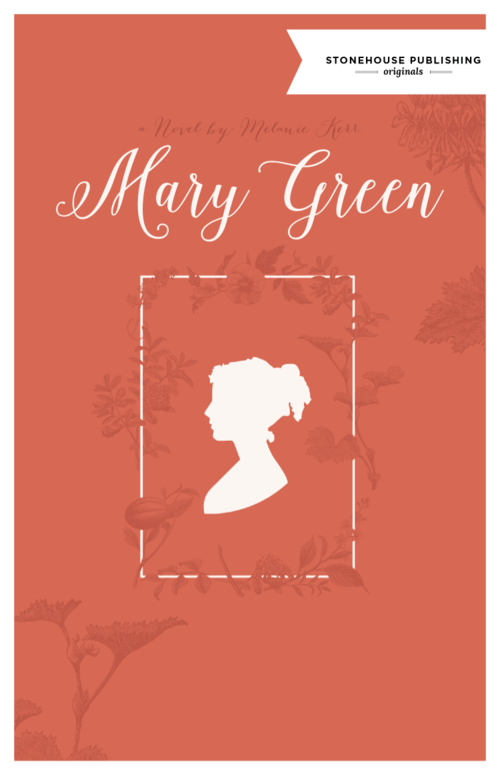
MARY GREEN
MELANIE KERR
Historical Fiction, Regency era
Release Date: May 1, 2016
320 Pages / 5”x7.75”
Promotion: Alberta author events, National review mailing,
online promotion and select advertising
Trade paperback
$19.95 CAD
ISBN 978-0-9866494-4-8
Hardcover
$32.95 CAD
ISBN 978-0-9866494-5-5
SYNOPSIS:
Mary Green, obscure orphan and ward of the wealthy Hargreaves family, has always accepted her inferior position with grace, humility, and gratitude. When she discovers that her only friend is to leave the country forever, that her confidence has been betrayed by the unfeeling youngest daughter of the family, and that her very deprivation is the object of the mockery and scorn of everyone she has sought to honour, she determines to cast them off and make her own way in the world. On her twenty-first birthday, free to choose her own destiny, she dreams of peace and tolerance, and perhaps a partner who might be noble enough to love her in all her simplicity. But when an unexpected foray into London society disrupts all her plans, she is faced with an uncharacteristic storm of feelings. Will she grow strong and happy in her independence, or will her character be lost amidst her newfound ambition? Unable to trust the whims of her own heart, Mary is forced to confront the question that has forever plagued her: Who is she and where does she come from?
Chapter 1
The name of Mary Green was so far beneath the notice of Miss Hargreaves and her sister that its bearer hardly heard it spoken except in rare occasions of company. When forced to address the poor girl, it was therefore as simply ‘Polly,’ and most often uttered with resentment at being required to acknowledge her existence at all.
The three young ladies lived at Challey Hall in Oxfordshire, with the late Mrs. Hargreaves’ younger sister, Miss Preston. The house was by no means the largest in the county, but it was not so small that a lady on one floor in the east wing might be expected to hear the call of her cousin on another floor in the west.
“Polly!” cried Miss Augusta from the seat of her dressing table. Though she was a little more friendly than her sister, she was neither so humble as to call Mary by her proper name, nor so selfless as to go in search of her rather than sit and grow angry at Mary’s being so careless of the feelings of others as to be out of hearing distance when she was required.
Augusta called for Polly again, drawing out the sounds in an insistent and desperate holler, unequal to imagining that Mary may have any other engagement but to wait, out of sight of her cousins, for the moment she may be needed by either of them. Augusta let go an impatient sigh, glared into the mirror and drew a great breath to call again for that wretched little creature when the door of her chamber flew open.
“What on earth do you do, Gussy?” was the indignant reply, for it was not Polly who had burst in and indeed never burst anywhere, but Dorothea, the elder Hargreaves girl, gliding across the carpet to stand over her sister in breathless elegance. “Do not you think how ill it becomes you to shout the whole house down like that? Do you wish people to think you savage?”
“I know not what people there are in this house whose opinions might concern me, unless you mean Aunt Preston or the servants. Clearly Polly does not hear me.”
Dorothea, catching sight of herself in the mirror was instantly distracted and calmed by the thought that she must have a new day gown made, one just like Lady Darlington had brought back from Paris. It would suit her figure so much better than Lady Darlington’s. She lowered her eyes to her sister’s surly reflection.
“Well, go and fetch her then,” she said, “if you need her so.” She raised her eyebrows at Augusta’s image then turned and strode back across the room. Stopping to look the door frame up and down as if in disapproval, she added, “And if you think the talk of servants benign, I could tell you a sobering tale or two,” and left the room.
Augusta watched her sister in the mirror as she departed, then sat in furious silence. She would not give Dorothea the satisfaction of seeing her follow her instruction to go and find Mary, but neither would she expose herself to further insult by calling out again. After a few moments of internal debate, she gave up and threw herself onto her bed, taking up a novel from the nightstand and attempting to read it while her mind replayed every act of insolent superiority ever perpetrated against her by her sister.
On hearing a knock, Augusta looked up over the book to see the figure of Mary, standing just outside the open door, which Dorothea had not deigned to close upon her departure. “Your sister said you were calling for me,” she said.
“Did she go and fetch you?” asked Augusta. “How like her.” She threw down her book and slipped off the bed and back into place before the mirror. “Will you please come and help me, Polly” she said, beckoning to Mary, who came and stood beside her. “I am utterly distraught over the Westley Ball. All three of the Ingles brothers are going to be there, even Lord Marsden. You do remember him? Of course you do. One does not forget Lord Marsden.” She heaved a great sigh at the thought of being noticed or – dare she even hope? – asked to dance by such a gentleman as the unparalleled Lord Marsden. “But what am I going to wear that can possibly draw the attention of any of the gentlemen away from Dorothea?” She shook her head. “I could not tolerate being outdone by her again. She has allowed me to borrow any of her pieces that I should like,” she indicated a selection of jewels laid out on the table, “yet I know they shall all be of no use to me.”
“That was very kind of her,” Mary offered. “Several of these are among her favourites, I am sure.”
“It is nothing like kindness” Augusta spat. “It is a twisted sort of conceit. She knows I shall never look as well in any of them as she does, and she only proves her own supremacy by allowing me to demonstrate as much. And of course she is right. She shall wrap herself in some torn old rags with a fishing net on her head, and everyone shall announce her the most natural and unaffected beauty in the kingdom. She is so blessed tall; she might wear anything to advantage, just like you. I am the only poor dwarf in this house. I am no less deserving than her and yet I get none of the attention.”
“I may be tall, it is true,” said Mary, choosing the most delicate necklace from the table and fastening it around Augusta’s neck, “but I will always want Dorothea’s grace. I am rather plodding I am afraid, and shall never be as dainty as yourself.”
“Well that is true, I suppose,” Augusta conceded, touching the necklace and turning her head to admire it from both sides.
“Gentlemen like a dainty lady, or so I am told.” Mary took down the gowns that had been hung beside the mirror.
“Let your sister envy you for a change,” she said, “and regret her great, towering form. Here,” she held out a white sprigged muslin. “The subtlety of this fabric would be lost on her, and will flatter you very well I think.”
“But it is so plain,” complained Augusta, who, though not quite so handsome as her sister, was still rather pretty. “I am already so plain. I shall draw no attention in that.”
“Take a little of the lace from this gown,” said Mary, picking out an elaborately embellished silk “and add it to the muslin. You have several days until the ball. I am sure Ellie will be able to accomplish something very pretty in plenty of time.”
“That is a thought,” said Augusta, looking over the two gowns.
“And I am sure we can make good use of some of your ribbon for your hair, and there are some charming little flowers in the gardens just now. No doubt they would be quite happy to be liberated for your adornment.”
“Oh Polly, would you do that for me?” she simpered. “And please tell Ellie just how the gown should be made up. I know I should make a mess of it, and before such company, I should be mortified. I simply cannot allow Dorothea to keep all the gentlemen to herself.”
“Only one gentleman may marry Dorothea,” said Mary, taking up the two gowns. “There will be others left for you, you know.”
“Perhaps, but I should like to be somebody’s first choice, and besides, who is to say they shall not all squander their lives in pining for her if they cannot find her equal.”
“Let us not despair of that quite yet,” said Mary, as she gathered up the gowns.
Augusta eyed her ruffled burden. “I would loan you something to wear but I just do not think anything I have would fit you without irreversible adjustment. I am afraid you must look to Dorothea for that.”
“Something to wear?” said Mary.
“Well, you cannot go in your old house dress. It would reflect badly on us. I am sure Aunt Preston will see it that way.”
“I am to go to the ball?” Mary was all confusion. She was never invited to join the Hargreaves girls on social outings. She was not even a blood relation, after all, though she was always referred to as a cousin. Mary was, in fact, a nobody, and only permitted to remain in their house out of what the sisters regarded as a misplaced sentimentality on the part of their ever absent father.
“I should hope so!” said Augusta. “You were particularly mentioned in the invitation, and I do not think Aunt Preston would take it very well if you were to refuse. It would look like ingratitude.”
“No, of course, I should not wish to give offense, and I have no cause to refuse. I am merely surprised to have been invited.” The honour of an invitation to Westley Park was more than she ever expected to receive, and she felt the thrill and the apprehension of attending such a great occasion as such a humble character. Already she began to think how she might make over a tattered cast-off of Dorothea’s which hung in her closet, though next to the sisters Hargreaves, she knew she would always look the penniless orphan that she was.
“Well, you must not make yourself too pretty,” Augusta scowled. “It is one thing to be outdone by Dorothea, but if you were both to appear more handsome, it would be quite intolerable and I should never forgive you.”
Mary knew Augusta too well to think her in jest, though the notion that Mary could ever be more remarkable than either of her cousins was most ridiculous. “I do not think you need worry about that,” she said. “I shall be the one in rags and no one has ever called me a natural beauty.”
“Oh do not be so self-pitying. It does not become you.” Augusta turned and waved Mary away. The latter bit her tongue as she always did, recounted to herself all her many blessings, and made her way from the room, leaving the other girl to herself and to the misery of her sister’s jewels.
ABOUT THE AUTHOR

Melanie Kerr studied linguistics, English, and theatre at the University of British Columbia, and law at the University of Alberta. Kerr is a reckless lover of clotted cream, a staunch defender of the semi-colon, and a fierce opponent of unpleasant music. She wooed her current and only husband with false promises of skill at word games and eternally good hair. She lives in Edmonton, where she raises her three young children, sews her own Regency costumes, organizes Regency costume events, blogs on all things old and English, endeavours to take over the world, and occasionally practices law.
AUTHOR AND BOOK LINKS:
PUBLISHER: stonehousepublishing.ca/mary-green.
Amazon: http://www.amazon.co.uk/Mary-Green-Melanie-Kerr-ebook/dp/B01CO6G3OO
Order direct from distributor: https://alllitup.ca/books/M/Mary-Green
iBook: https://itunes.apple.com/ca/book/mary-green/id1078046045?mt=11
Twitter @MelanieKerrAuth and Facebook as Melanie Kerr Facebook: https://www.facebook.com/Melanie-Kerr-1632156983713281/
Mary Green Facebook Page: https://www.facebook.com/Mary-Green-787275638069617/?fref=ts.
The author is doing daily blog posts in the lead up to the read-along which begins on May 13. My first post is about what a read-along is and how it works. You can find it at http://www.melaniekerr.com/2016/05/what-is-read-along-anyway.html.
BOOK TRAILER RELEASE https://www.youtube.com/channel/UCIn1Mil6l-w4f3pPD9wm6WA.
 Good morning Linda and welcome. Can I start, as always, by asking you a little about yourself? Hi Jo. Thank you so much for having me on your lovely blog.
Good morning Linda and welcome. Can I start, as always, by asking you a little about yourself? Hi Jo. Thank you so much for having me on your lovely blog. influenced his song lyrics, but we only had a brief time to talk so I’d like to follow that up. I have a theory that you can trace the history of poetry through his so I’d like to chat a bit more about that with him.
influenced his song lyrics, but we only had a brief time to talk so I’d like to follow that up. I have a theory that you can trace the history of poetry through his so I’d like to chat a bit more about that with him.


 Good morning and welcome. Can I start, as always, by asking you a little about yourself?
Good morning and welcome. Can I start, as always, by asking you a little about yourself?


 Good morning Jan and welcome. Can I start, as always, by asking you a little about yourself?
Good morning Jan and welcome. Can I start, as always, by asking you a little about yourself?

 Good morning Sheila and welcome. Can I begin the interview by asking you a little about yourself?
Good morning Sheila and welcome. Can I begin the interview by asking you a little about yourself?